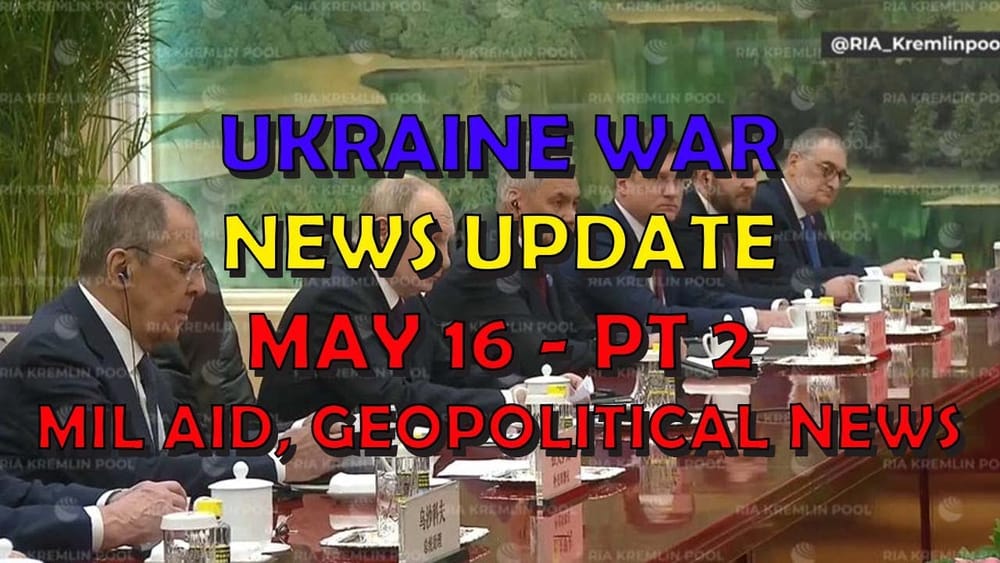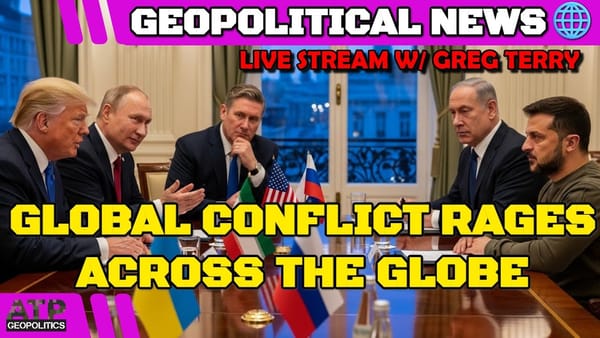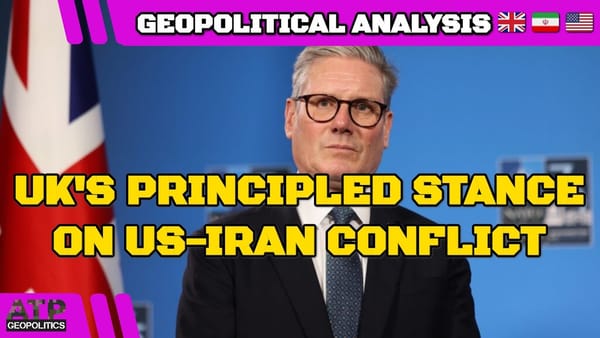Ukraine War Update NEWS: Military Aid & Geopolitics News
Table of Contents 📖
"Putin was humiliated on arrival at Beijing. So the president of China couldn't even be bothered to turn up to meet the indicted war criminal."
Hello Team
🎦 00:00-00:42⏩
Jonathan welcomes viewers to the second part of his daily Ukraine War Update for 16th May 2024 and explains that this video combines Military Aid and Geopolitics, noting that yesterday there had been a lot of news about military aid. Jonathan wears a Vyshyvanka for National Vyshyvanka Day and thanks Mark and Alina for the shirt. He reminds viewers about the drone strike in Tula that was reported in the first part of his update this morning.
Return to top⤴️
Ukraine: Drone strike in Tula
🎦 00:42-02:05⏩
Jonathan expands on an earlier report about the drone strike in Tula, noting that this was deep inside Russian territory and hit the production facilities of a state-owned Russian defence complex. He explains that the complex is a key enterprise for the production of ammunition and weapons for Russia’s ground forces, air force and navy. He stresses the importance of Ukraine striking such facilities, not just to reduce the flow of supplies to the front line but also to impact on the Kremlin’s ability to finance the war.
Return to top⤴️
France: Military Support for Ukraine
🎦 02:05-03:16⏩
Jonathan reports that the French company, Arquus Defense, is establishing a support chain within Ukraine to maintain the Caesar self-propelled guns and VAB armoured personnel carriers it has supplied. He welcomes the fact that this should avoid the need to return damaged vehicles to France for repair. He reminds viewers that the delivery of the first 11 Bastion armoured vehicles, out of a total order for 111, is expected to start in July.
Return to top⤴️
France: Possible use of French troops in the Ukraine War
🎦 03:16-04:42⏩
Jonathan notes reports that France has been checking the intended targets of Storm Shadow missiles supplied to Ukraine to ensure that they are not used to strike Russian territory. He expresses disappointment at reports that France has abandoned a plan to deploy small military units, possibly drawn from the European Gendarmerie Force, to patrol the border between Ukraine and Belarus because of the risk of direct conflict with Russia.
Return to top⤴️
Germany: Reimbursement for military aid; plans for arms manufacturing in Ukraine
🎦 04:42-06:07⏩
Jonathan reports that Anton Gerashchenko has welcomed plans by the German arms manufacturer, Rheinmetall, to open a new facility in Ukraine to manufacture air defence systems, although a company spokesperson has stated that it will be one to two years before production starts. Ahead of the announcement, Rheinmetall had published details of the military equipment it had already supplied, including hundreds of thousands of artillery shells, ammunition for Gepard anti-aircraft systems and battle tanks, more than 100 Marder infantry fighting vehicles, mobile and medical hospitals and many other systems.
Return to top⤴️
Switzerland: Arms exports
🎦 06:07-09:58⏩
Jonathan casts doubt on reports that Switzerland is planning to supply Ukraine with Patriot air defence systems, given that the Swiss government has said it will continue to prohibit weapon shipments to Ukraine. He notes that, despite demands from Swiss MPs for increased flexibility to support the country’s arms industry, Swiss law currently restricts arms sales to countries at war unless they are under a UN mandate. This has resulted in a 27% drop in arms exports during 2023, despite a global surge in defence production. Jonathan argues that Switzerland cannot maintain a policy of neutrality and, at the same time, expect to have a competitive arms export industry.
Return to top⤴️
Slovakia: Shooting of Robert Fico
🎦 09:58-12:25⏩
Jonathan reports that Robert Fico, the former Prime Minister of Slovakia, is now in a stable condition following the attempt on his life and, according to Slovak media, will live, although he is scheduled for further surgery today. He reports suggestions by journalists that the man who shot Fico may have links to the pro-Russian paramilitary group, Slovensky Branky (Slovak Conscripts). He notes that Slovensky Branky has links to the pro-Kremlin biker movement, Night Wolves, and that their leader was trained by former Russian special forces. He expresses concern that, although Fico is pro-Russian, if the gunman is shown to be acting on behalf of Russia, this will deter Slovakia from moving further into the Russian sphere of influence.
Return to top⤴️
China: Putin’s visit
🎦 12:25-19:15⏩
Jonathan notes that Putin has travelled to China for a two-day visit, his first foreign trip since his re-election. He suggests that, contrary to normal diplomatic protocol, Xi Jinping deliberately snubbed Putin by failing to meet him on his arrival in Beijing, sending a female official instead. Jonathan argues that this was a deliberate power play designed to humiliate Putin and to underline that China is the dominant partner in the relationship. He argues that China would benefit most from a Russian defeat as they would then be in a position to pick up the pieces of a broken Russia and seize territory in the east of the country that China regards as rightfully belonging to it. He argues that Russia’s dependence on China for financial and military aid has already turned it into a vassal state. He notes that Putin is accompanied on his trip by Shoigu, the former defence minister, Belousov, the new head of the MOD, and Lavrov, the foreign minister. He argues that their presence demonstrates that the main purpose of Putin’s visit is to procure weapons and military equipment.
Return to top⤴️
EU-Russia: European banks’ profits from Russia
🎦 19:15-20:14⏩
Jonathan cites a report in the Financial Times that the combined headcount of the five EU banks with the largest Russian operations has fallen by just 3% since the invasion of Ukraine and their earnings have tripled thanks to the high interest rates they are receiving on their Russian assets.
Return to top⤴️
Austria/EU/US: Raiffeisen Bank International
🎦 20:14-21:23⏩
Jonathan reports that Raiffeisen Bank International (RBI), which is Austrian-owned, made half of its profits from its Russian operations last year. He notes that the US Treasury has threatened to impose sanctions on RBI because of this. He suggests that Austria had used the threat of sanctions against RBI to gain leverage in negotiations with the EU over a €50 billion aid package.
Return to top⤴️
EU/Russia/Turkey/India: Russian oil being routed to EU
🎦 21:23-23:44⏩
Jonathan reports that Turkey has become a key transit point for Russian oil being routed to the EU. From February 2023 to 2024, Turkey’s purchases of Russian oil increased by 105% and its fuel exports to the EU rose by 107%. He explains that this is possible because EU sanctions allow the import of blended fuels that include Russian oil, provided that they are labelled as non-Russian. He draws a comparison with food products that can be labelled as ‘made in the UK’ even if none of the ingredients actually came from the UK. He states that India has also increased its imports of Russian crude which it then refines and sells on at a profit to the West.
Return to top⤴️
UK: Select Committee Hearing - Bill Browder
🎦 23:44-41:44⏩
Jonathan welcomes the opportunity to hear Bill Browder, the architect of the Magnitsky Act, giving evidence to a UK parliamentary select committee hearing on sanctions against Russia. He praises the UK parliament for the non-partisan nature of the hearing and for inviting Browder to give evidence, contrasting it favourably with the situation in the US. He plays a lengthy excerpt from the hearing in which Browder describes how sanctions have had a significant impact on the Russian economy, citing the decision by the West to freeze more than $300 billion of Russian central bank reserves, its success in sanctioning 98 oligarchs, the ending of foreign borrowing by the Russian government and Russian companies and the withdrawal from Russia of 1,500 Western companies. However, he argues that more needs to be done to close the loopholes that allow Russia to fund the war in Ukraine. He states that the main loophole is Russia’s continuing sale of oil. Whilst the volume of Russian oil sold directly to the West has fallen by more than 80%, Russia is now selling to other countries such as India, China and Turkey, and some of this oil then finds its way back to the West as refined products. Browder points out that the UK bought $2.2 billion worth of these refined products last year. He argues that as long as the West continues to fund the war in Ukraine, whilst at the same time buying Russian oil, Putin will believe that time is on his side and that the West will eventually lose interest in supporting Ukraine, particularly if Donald Trump wins the next US presidential election. Browder suggests that the West could seize the $300 billion of Russian foreign currency reserves that were frozen by Western governments at the start of the war and use them to fund Ukraine’s war effort. He argues that, although this could undermine confidence in Western currencies, this risk could be minimised if it was done on a co-ordinated basis by all of the countries involved. Later, in response to a question, Browder suggests that the UK could recover assets belonging to sanctioned individuals hidden in the UK, which he estimates could be worth as much as $230 billion, by making it a legal requirement for accountants, lawyers and other professionals who work for these individuals to disclose their assets. Jonathan describes Browder’s evidence as being ‘information rich’ and urges his viewers to watch the whole of his testimony.
Return to top⤴️
Finland: Border with Russia; Baltic States: Georgia
🎦 41:44-43:50⏩
Jonathan reports that Finland is to change its conscription laws to allow reservists to help patrol its border with Russia in the event of a sudden wave of migrants. He notes that the foreign ministers of Lithuania, Estonia and Iceland joined protests in Tiblisi against a new law on ‘foreign agents’. He welcomes the fact that the Georgian government’s increasingly pro-Russian stance is attracting attention from the Western media.
Return to top⤴️
Germany: Investigation into pro-Russian politician
🎦 43:50-47:12⏩
Jonathan reports that Peter Bystron, a German MP and member of the far-right, pro-Putin AfD party, has lost his parliamentary immunity and is under investigation for money laundering and corruption. Police have searched properties linked to him in Berlin, Bavaria and Mallorca. Bystron is accused of having taken Russian money, allegedly channelled through the pro-Russian propaganda network, Voice of Europe, which has been placed on several sanctions lists. Jonathan welcomes the investigation, hoping that it will damage the AfD’s prospects in the forthcoming European elections.
Return to top⤴️
Moldova: Pro-Russian politician receives Russian passport
🎦 47:12-48:20⏩
Jonathan reports that Ilan Shor, a Moldovan oligarch and pro-Kremlin politician, has been given a Russian passport. Shor was sentenced to seven and a half years imprisonment by a Moldovan court for his involvement in a bank fraud but fled the country in 2019. He is currently subject to EU sanctions. Jonathan argues that Shor’s case demonstrates the extensive influence of Russia, which extends to many European countries and indeed around the world.
Return to top⤴️
Wrap up
🎦 48:20-48:41⏩
Jonathan acknowledges that the video has been a little longer than usual because he has combined his Military Aid and Geopolitics updates. He encourages viewers to watch Bill Browder's testimony to the UK Parliament select committee hearing in full, as well as his earlier TED talk.
Return to top⤴️




